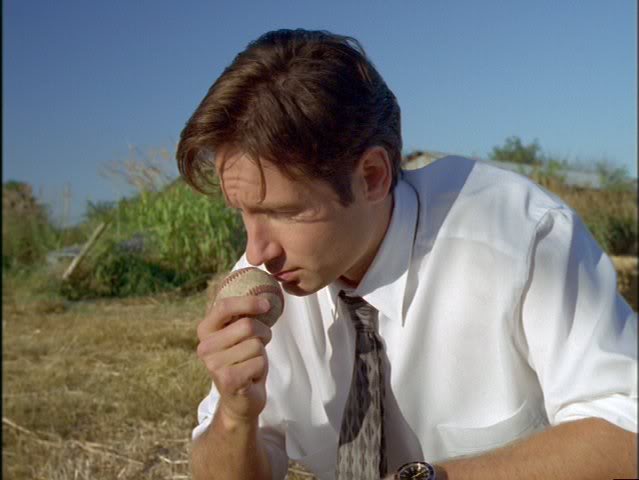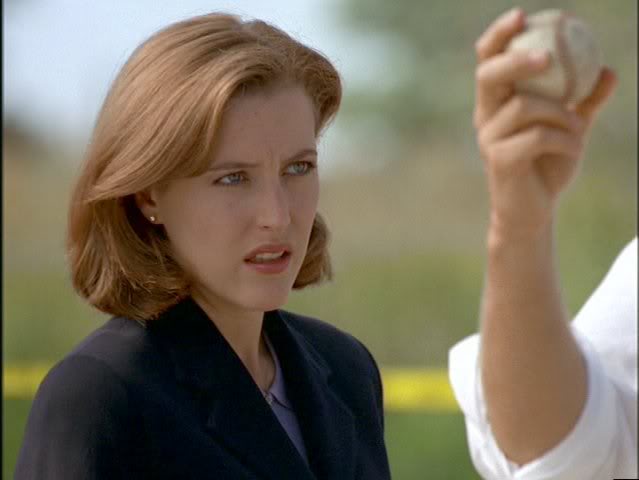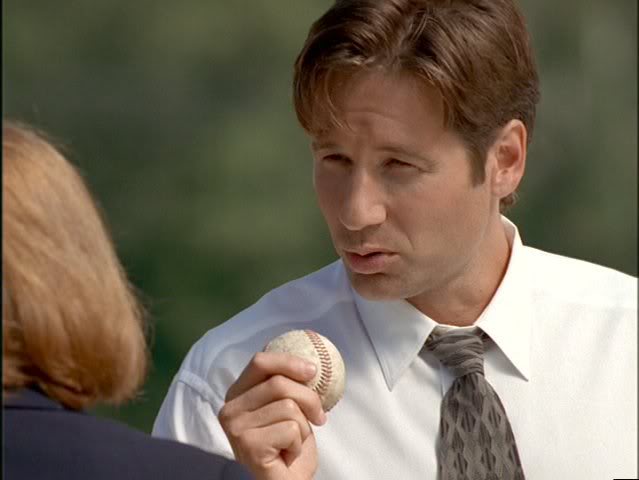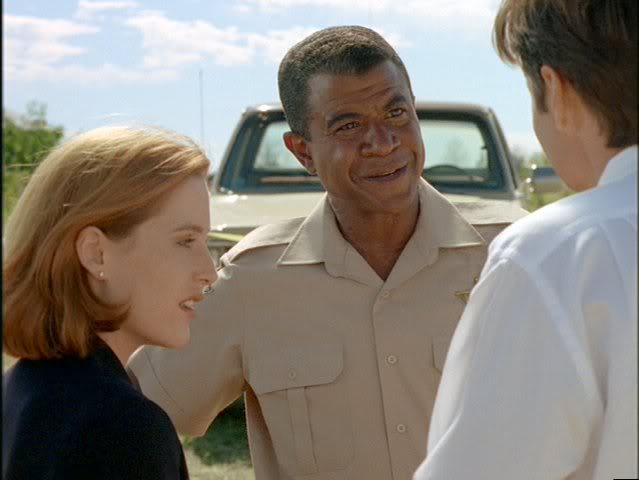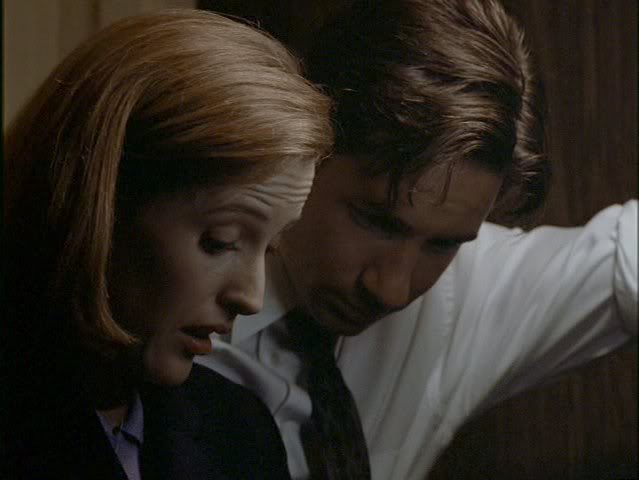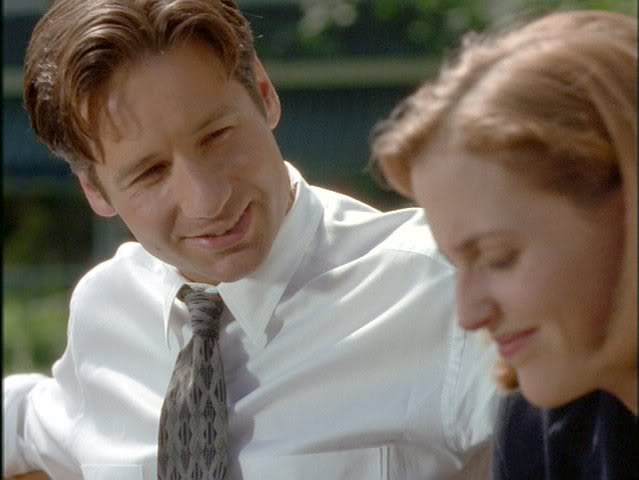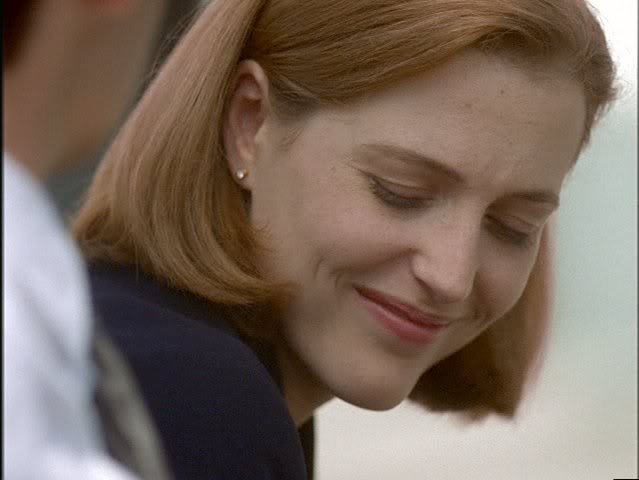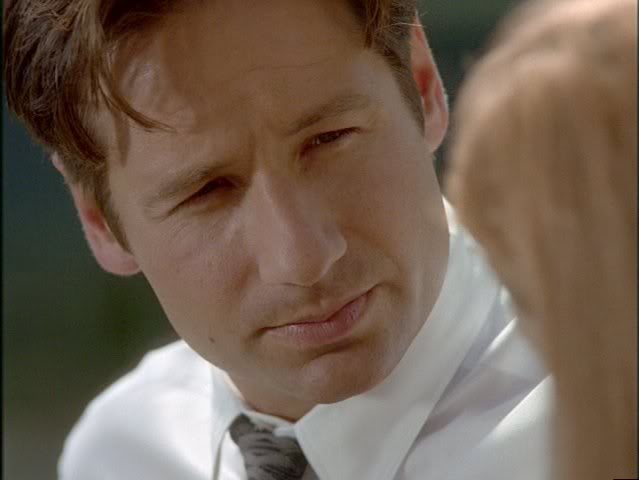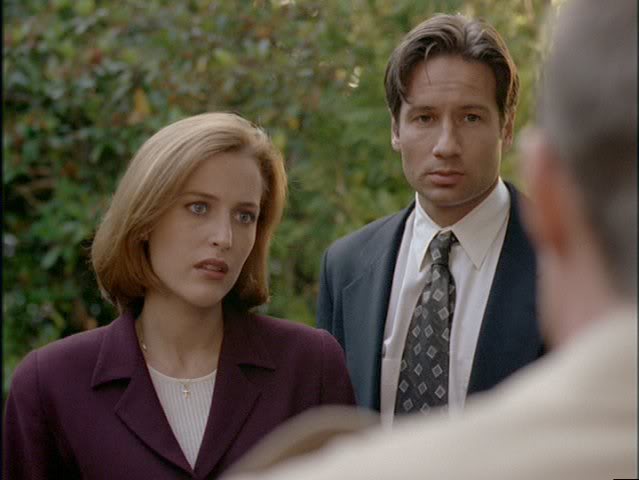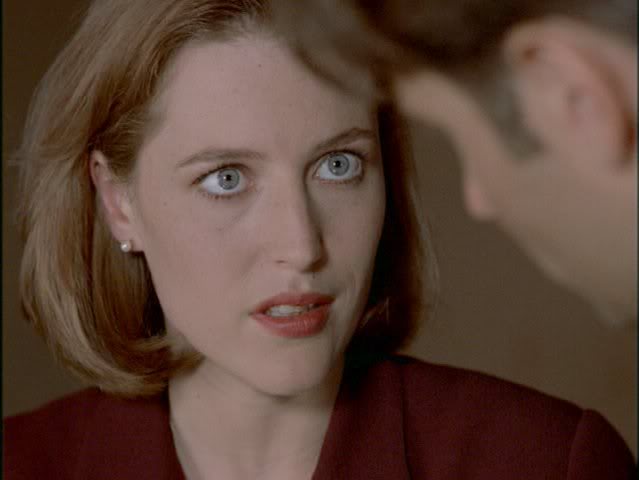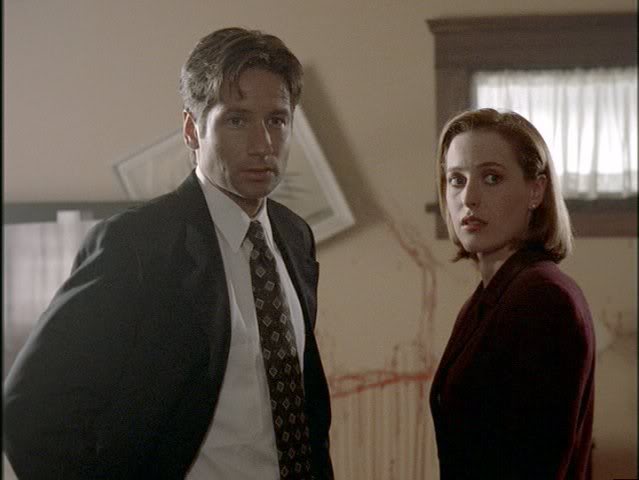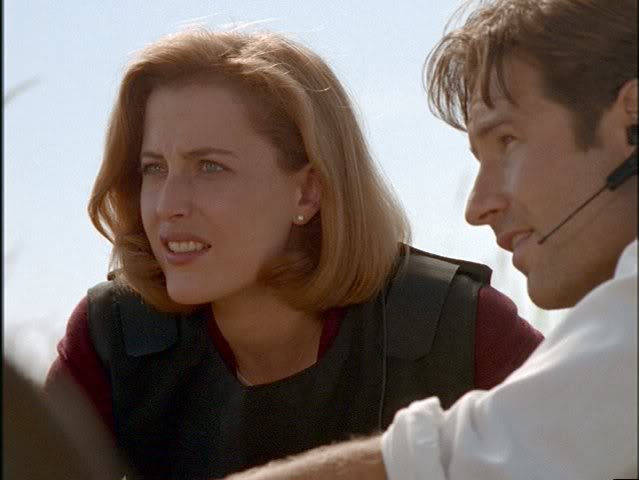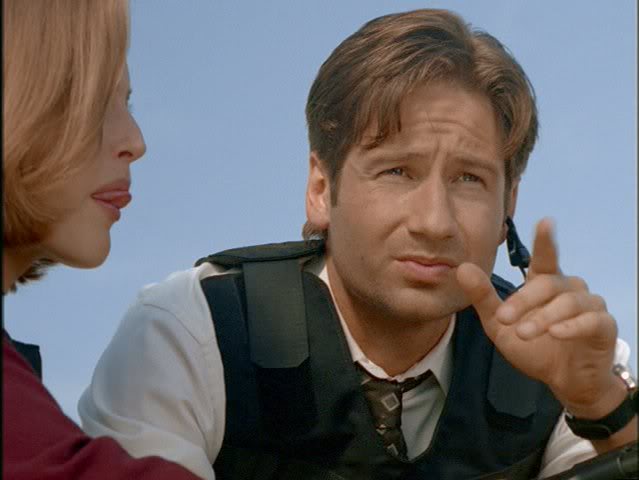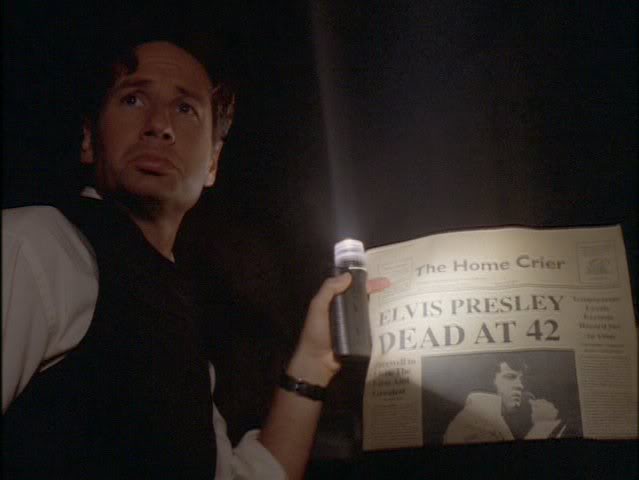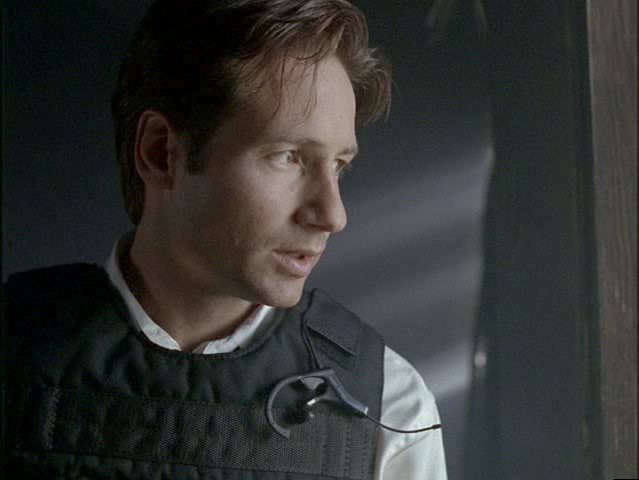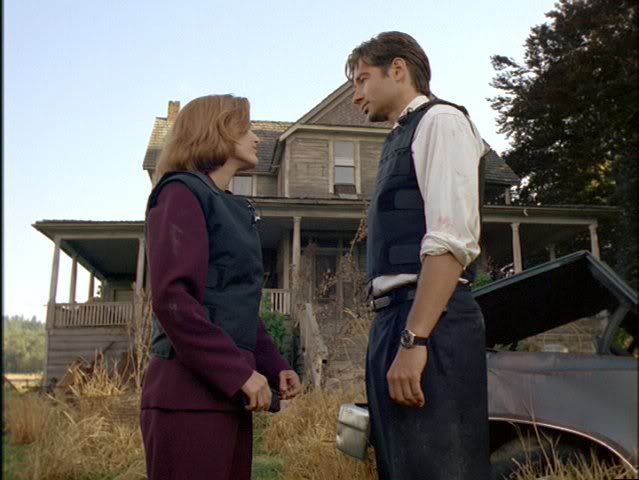CTP Episode of the Day - 09.28.06 - Home
Today's Cherished Episode: Home (4x03)
Original Air Date: October 11, 1996
Written By: Glen Morgan and James Wong
Directed By: Kim MannersWhile investigating the death of an infant in a close-knit rural community, Mulder and Scully uncover an even darker family secret.
"Scully, would you think less of me as a man if I told you I'm kind of excited right now?"
Some "Home" Tidbits & Musings:
-- When Chris Carter started The X-Files in 1993, one of his first tasks was to assemble the behind-the-scenes staff that would bring the show to life. With the help of Peter Roth, president of TV production at Twentieth Century Fox (and formerly the president of Stephen J. Cannell Productions) Carter made what he called "great hiring choices." Among those was the writing team of Glen Morgan and James Wong, long-time partners who had written for such shows as 21 Jump Street and Wiseguy for Cannell Productions when Roth was there. Morgan and Wong, who were also given the title of co-executive producers, wrote many of The X-Files most acclaimed episodes in its first two seasons (including "Squeeze/Tooms," "Ice," "Beyond the Sea," "E.B.E.," "Little Green Men," "Blood," and "One Breath"). They also created some of the show's most memorable characters: Eugene Victor Tooms, Luther Lee Boggs, Walter Skinner, and the Lone Gunmen, just to name a few.
-- Mid-way through the series' second season, Morgan and Wong got the green-light for a series they were developing, Space: Above and Beyond, so they left the X-Files and headed for Australia where the feature-length pilot episode was to be filmed. They kept tabs on The X-Files during the rest of the second and the third seasons, however, partly because Glen Morgan's brother Darin, who had suggested the storyline for Morgan and Wong's second season story "Blood," had come to work for Chris Carter full-time, turning out such classics as "Humbug" and "Clyde Bruckman's Final Repose." "I saw 'Humbug' in Australia while we were doing the pilot for S:AAB," said Glen Morgan, "and it just depressed the s--t out of me because I thought 'Man, that was great!' and I wished I had written it."
-- A more serious depression was to come when Fox cancelled Space: Above and Beyond after a single season, blaming the show's declining domestic ratings and rising production costs despite the fact that it had achieved more than moderate success in the U.S. and become the highest rated new series in the U.K. and several other countries. "It was so disheartening to have the show cancelled," said Wong. "We were sitting in our offices when they were tearing down the sets right below us. It was such a depressing day." The sets that weren't dismantled were incorporated into the sets for a show called Alien Resurrection and some were burned for another new show called L.A. Firefighters. "I was so bitter with the network," said Glen Morgan, "but we got some satisfaction that the executives who pulled our show subsequently received their own marching orders from the network."
-- Following the cancellation of Space: Above and Beyond, Chris Carter struck a deal with Morgan and Wong and announced that the "dream team" would be returning to write four episodes of The X-Files' fourth season, as well as a couple of scripts for Carter's new show, Millennium. Glen Morgan noted that it would be his pleasure to incorporate the names of some of the Fox executives responsible for canceling S:AAB into his XF scripts. "They're gonna be in the next X-Files," he said, "getting their heads cut off. I tell you, it'll be good therapy."
-- "Basically the understanding was that we were going to do four shows early on to get the writing staff squared away," Glen Morgan explained. "And Chris was great because I said, 'I'm doing four shows and I'm putting all our Space actors in 'em.' And Chris said okay."
-- Asked if the writing team felt the show had changed during its absence, James Wong said, "That's a real hard question to answer because we were only going to come back and do four shows, so we decided that we weren't going to worry too much about the mythology that had gone on and the relationships that had progressed, because we were only here for a short time [and] we felt like our shows would stand alone."
-- For his part, Glen Morgan was disappointed that the relationships hadn't progressed or developed the way he felt they should have. "I didn't think they spent enough time in year three going through the characters," said Morgan. "There were a couple of episodes -- Scully had one, and Mulder had a couple -- where they explored that side of it, but I kind of thought they had dealt more with the mythology of The X-Files than the characters themselves."
-- Morgan and Wong's "homecoming" was, appropriately enough, the episode entitled "Home" (also the name of the Pennsylvania town where the episode took place). True to his word about casting his Space: Above and Beyond actors in episodes of The X-Files, Glen Morgan pitched this episode to Chris Carter in this way: "I see James Morrison, Rodney Rowland, and Morgan Weisser as three big freak brothers!" (All three were cast members of S:AAB -- more on this later.)
-- The inspiration for "Home" came from three different ideas:
(1) A 1992 documentary called Brother's Keeper which Kristen Cloke (Melissa Ephesian in "The Field Where I Died" as well as Glen Morgan's wife) suggested the writing team watch. The documentary, directed by Joe Berlinger and Bruce Sinofsky, is about an alleged 1990 murder in the village of Munnsville, New York. In this rural farming community near Syracuse, New York (in the same county in which Glen Morgan's family lived when he was a child), four brothers -- William, Adelbert, Lyman, and Roscoe Ward -- lived in a dilapidated house. They were barely literate, had no formal education, and farmed land that had been in their family for generations. William Ward, who had been ill for years, died in his sleep. Adelbert was accused of killing him, perhaps by smothering. After a trial, Adelbert Ward was acquitted, largely because of the New York State Police's violation of his rights by coercing a confession out of him (which he later denied) and having him sign a written statement which he was unable to understand due to illiteracy. The moving documentary depicted the brothers as gentle, shy, harmless, toothless, uneducated, and undeniably likable "rural folk," with Adelbert as the victim of investigatorial overzealousness and perhaps even corruption (arising from an effort to get the Wards' land) in the State Police. The viewer was left with the impression that Adelbert may indeed have smothered William, not out of malevolence, but rather mercifully, having grown up on a farm where sick animals were put out of their misery and not realizing that society condemns the same treatment of humans.
(2) The book Dark Nature: A Natural History of Evil, by Lyall Watson. One may come up with theological or moral answers to the question of why men murder each other in acts of random violence, or why stepfathers abuse or kill their stepchildren, but in Dark Nature, Lyall Watson says part of the answer is found in biology. The book indicates Watson's view that by studying our biological heritage, we discover our basic evil genetic makeup and our power to overcome it. In the first part of the book, Watson studies the animal kingdom to discover the parallels with human behavior. (Mulder comments on the parallels between wild animals and the Peacock brothers in the episode.)
(3) An anecdote from Charlie Chaplin's My Autobiography. "Chaplin was touring England in a musical, and went to stay in this old tenement boarding house," explained Glen Morgan. "The family that ran it evidently took a liking to him, and they said, 'Come on upstairs, we're gonna show you something we don't show to too many people.' So he goes upstairs to this room with a cot and a hanging bare light bulb, and the family wheels out a young man with no arms or legs. They stand him up and start singing and dancing, and the kid kind of flops around. Of course, Chaplin was horrified. When they are done, they lay the kid back and roll him under the bed, and say 'Wasn't that great?' And he's just mortified. I think I read that like 13 years ago, and ever since then I thought, 'God, I gotta do something like that!'."
-- "It often happens that you'll get one image and you'll build a show around it," said James Wong. "And for 'Home,' the image that was the strongest in our minds was the mom, when she's wheeled out from under the bed. We sort of built the whole show around this one horrifying image."
-- When Morgan and Wong returned to the X-Files fold, they already had ideas for the four shows they were going to write. "We had ideas for 'Home,' 'The Field Where I Died,' 'Musings of a Cigarette Smoking Man' and a fourth one which we actually changed," Jim Wong recalled. "But which one should we do first? We wanted to come back with a bang, and of the four ideas, 'Home' was the most visceral, the most action-oriented, the creepiest and the weirdest." Their intention, the writers said, was not to gross everyone out, but to make something shocking. They felt that season three lacked the horror element that the show once had.
-- Morgan and Wong felt another thing the show was missing since they left was the "Mulderisms," so they made a conscious effort to inject more humor into "Home."
-- When he received the script for "Home," its humor wasn't what grabbed director Kim Manners: "I thought, this is my moment to do a classic piece of film. I was raised on Frankenstein movies ... Boris Karloff ... Lon Chaney, Jr., was a huge hero of mine for The Wolf Man. When I read this, I thought this is as classic a horror script as I'm ever going to see as a director."
-- "I remember when the script for 'Home' came in and it was sent up to Vancouver, the producer up there, J.P. Finn, came over to me and he said he thought we had gone too far this time," remembered Chris Carter. "He thought that it was pushing the limits of good taste to have suggested that there was incest going on in this episode. I assured him that it would be done tastefully, as I believe it was done."
-- Fox's Standards and Practices freaked out over the storyline, but agreed to it on the condition that the Peacock boys not simply be mental rejects but be monsters as well. Glen Morgan said, "They weren't going to approve people that you could come across in real life. Also they didn't want the Peacocks to talk." With no dialogue, and all the prosthetic monster make-up required, Morgan's plan to cast James Morrison, Rodney Rowland, and Morgan Weisser went out the window. But each would get his turn in a future X-File episode: Rowland played Ed Jerse in "Never Again." Morgan Weisser played Lee Harvey Oswald in "Musings of a Cigarette Smoking Man." But James Morrison wouldn't get his chance until Season 7's non-Morgan & Wong script, "Theef," in which he played Dr. Richard Wieder.
-- With its semi-gleeful incorporation (celebration?) of blood, gore, incest, genetic nastiness, and one of America's most-beloved TV dads, this episode remains a particularly memorable one -- not only to viewers but to the Fox Network censors.
-- "When (Director of Standards and Practices) Linda Shima-Tsumo first saw 'Home,' I thought she was going to just about have a heart attack and die," said director Kim Manners. "I shot a lot more of it than they ever allowed to get on the air." Other X-Files staffers recalled several other knockdown battles over the issues of good taste and on-screen bodily fluids.
-- The lead actors relished Morgan and Wong's teleplay. "I think it was wonderful. One of our best shows," said Gillian Anderson. David Duchovny agreed. "I didn't really get 'Home' when I read the script or when we started to do it," he said, "but the finished product was really funny and kind of disturbing. I really liked that."
-- For the very first time in X-Files history, there was a parental advisory at the beginning of the show: "Due to Graphic and Mature Content, Viewer Discretion is Advised."
-- The job of filming "Home" turned out to have almost as many weird quirks as the episode itself. The show was a point of pride for special effects makeup master Toby Lindala, who not only transmogrified the actors playing the Peacock brothers, but constructed the genetically deficient baby.
-- "Originally, we had a pass on the sound mix in which the baby was crying," said co-executive producer Paul Rabwin, "and sounding very sickly. I'm telling you, the hairs on the back of your neck stood up. And the final shot of the teaser was this big glob of dirt right in the camera as if it's the baby's point of view, and then the little screaming shuts up."
-- Added David West, Recording Mixer: "In the original version, the baby was born alive and we buried it alive, and the baby's crying, and we covered it with dirt, and it was really a horrifying opening act, so horrifying that Standards and Practices said, 'Oh, no no. The baby can't make a sound. It's dead from the get-go." (Although later in the episode, Scully confirms that the baby inhaled some dirt, indicating it was alive when buried.)
-- Oopsie! In the teaser, Mother Peacock is giving birth and is screaming in obvious pain; but later, she tells Scully that she can't feel pain, a result of the genetic disorder caused by the family's inbreeding.
-- "Home" featured something special in the way the legend appeared on screen in the first act of the episode. There was a close-up of "home plate" as it was dropped into view, and the word "Home" appeared in the lower left corner of the screen (in the same way all XF episode legends did). Just as devoted X-Philes began to wonder if the series was going to start showing the episode titles at the beginning of the episode, the camera pulled back and the completed line "Home, Pennsylvania" appeared in the usual legend location. Very clever and a nice touch.
-- Mulder talked about his sister Samantha in a context other than her abduction for the first time in this episode. He reminisces about the things they did as children on the Vineyard.
-- Editing Nit-pick: During Mulder and Scully's first conversation with Sheriff Taylor at the infant-burial site, the exact same reaction shot of Scully is used twice; she makes a facial expression, looks down and to her right, and some strands of her hair blow across the top of her head.
-- Although there was much speculation that the inbreeding family (the Peacocks) were named for the mascot of NBC (because of their new 'copycat' shows in the 1996-97 TV season (Dark Skies, The Pretender, and Profiler), the family was really named after some former neighbors of Glen Morgan's parents.
-- The building that served as the Peacock House -- after it was purposely and thoroughly dilapidated by the art and construction departments -- served once before on The X-Files. It was Harry Cokely's home in "Aubrey," and was actually located in South Surrey, near the U.S./Canadian border.
-- Sheriff Andy Taylor and Deputy Barney Paster are references to the 1960s sitcom The Andy Griffith Show which featured Sheriff Andy Taylor (played by Andy Griffith) and his Deputy Barney Fife (played by Don Knotts) who lived and served as law enforcement in the small town of Mayberry, North Carolina. Though Deputy Paster wouldn't admit it, they also both resembled their namesakes: both Andy's were calm, laid-back, content with their small-town ways, and didn't carry a gun; and both Barney's were more nervous and ready to use their weapon at the earliest opportunity (though Barney Fife had to carry the bullet for his gun in his shirt pocket).
-- A scene in which Mulder and Scully jostled each other suggestively in the tight confines of Sheriff Taylor's supply closet/morgue was filmed but ultimately cut. (It can be seen on the Season 4 DVD's.)
-- The science advisor to the series, Anne Simon, Ph.D., pointed out in her book The Real Science Behind the X-Files that the genetic deformities Scully observed in the dead infant (Nev-Laxova Syndrome, Meckel-Gruber Syndrome, and entropy of the cloaca) are quite rare, and that she would have had to have been well-versed in genetic abnormalities to have recognized all of these conditions without consulting outside experts. Dr. Simon mentions a standard reference book, Smith's Recognizable Patterns of Human Malformation, as something Scully may have had the opportunity to consult before this case, thus familiarizing herself with the information.
-- The "conversation on the bench" was written to bring out the idea that maybe Mulder and Scully didn't know each other as well as they thought they did, to show that you could be very close with someone yet not really know them at all.
-- The 1958 Cadillac hardtop that served as the murderous Peacock brothers' vehicle was a near-hopeless wreck -- painted pink and blown up during the making of another TV show -- that was rusting peacefully on a real farm outside Vancouver. It was located, rented, and "restored" by transportation department staffer Nigel Hapgood. Under tremendous time pressure, Hapgood worked frantically to stay one step ahead of the cameras, sawing off its top, then banging into place whatever body panels and/or chrome strips were due to be in camera range on a given day.
-- However, Hapgood never did get all of the beast's mechanical systems working simultaneously -- the brakes were particularly unreliable. Which made it all the more peculiar that after the episode aired, the show received a letter from Cadillac thanking The X-Files for putting one of their products in the show.
-- "Home" generated many scenes for the gag reel; one of the most notable was David Duchovny poking Gillian Anderson with the TV antenna in a most inappropriate location.
-- This episode features the song "Wonderful, Wonderful" by Johnny Mathis. Why that song? Glen Morgan said, "There's something about that song that's really creepy: it's too wonderful; it's so wonderful, it really bothers me."
-- Though the version of "Wonderful, Wonderful" heard in the episode sounds a lot like Johnny Mathis, it's not. The crooner who sang the tune over the Peacock's car radio was almost -- but not quite -- former X-Files and Millennium producer-director David Nutter. A professional singer in college, Nutter volunteered to do the deed. But at the last moment, co-producer Paul Rabwin found another man who sang too uncannily like Mathis to pass up. That man was Kenny James, and Deborah Ludwig Davis sang back-up on the song.
-- This was the first X-Files editing job for Michael Stern, and what a fantastic job he did. The long scene that cuts from the Peacock brothers getting into the car and blasting the stereo to Sheriff Taylor and his wife on their porch to a sleeping Scully to the Peacock car cruising down the highway to Mulder watching the nature documentary back to the Sheriff's house is perhaps the most suspenseful 30 seconds in the series' history, creating a real sense of dread for the viewer as to where the Peacock boys are headed. Glen Morgan said the extended scene was written because he and Jim Wong felt the show no longer took up a lot of time building up a potentially scary scene. "Now they just open up a toilet and there's a rat," he said.
-- More than any other scene in "Home," the bludgeoning deaths of the Sheriff and his wife caused the biggest stir among viewers and the censors. Kim Manners said, "I am a firm believer that more than outrage at beating the sheriff and his wife to death and the incestuous family relationship with the Peacock family, I think people were frightened by that show because it played to their first fear in life, that there's something under the bed. And I think that's what bugged America and I don't think they even realized it. Frightening images, that's what this show was about."
-- The hogs appearing in the pig-sty scene with Scully and Mulder were not computer-generated. They were rented, as dirty and smelly as they looked, and -- despite what the script said -- at all times eager to escape their confinement and knock off work early. For that reason, while Anderson and Duchovny, in camera range, pushed against the pigs' hindquarters from their end of the herd, a team of pig wranglers, safely out of the shot, pushed them back toward the actors from the other.
-- When she impressed Mulder with what she learned from watching the movie Babe while baby-sitting her nephew (a reminder that Scully did have brothers out there somewhere), Scully uses the phrase "Naah-ram-ewe" to try to get the pigs to move. The actual phrase used in the movie is "Baah-ram-ewe." This is probably not so much an "oopsie" as the fact that many shows change phrases like this to avoid paying royalties. Had Scully said the actual phrase, the producers probably would have had to fork over a chunk of change for the privilege. Better to just change it, save some dough, and let the fans nit-pick the mistake.
-- Morgan and Wong return and so do the Elvis references! The writers loved to torture David Duchovny (who was not an Elvis fan) by tossing in an Elvis reference for Mulder in most of the episodes they wrote. In this one, Mulder makes a sad face when he reads the headline on the old newspaper: "Elvis Presley dead at 42."
-- Oopsie! We are told that the Peacocks built their farm in Pennsylvania during the Civil War, but when talking to Scully, Mrs. Peacock called the Civil War the "War of Northern Aggression," which is the way the war would be referred to by someone living *south* of the Mason-Dixon line during the war.
-- Oopsie! Scully posited that Edmund was not only the brother of the other two boys but also their father. But earlier in the episode we are told that the car crash that killed Mr. Peacock was 10 years earlier. Since the younger brothers appear to be in their 20's, if Scully was right, that would mean Edmund would have fathered the other two boys with his mother before the father died. That would make things even creepier than intended!
-- In the final scene, the "acceptable answer" as to what the mother and son are doing in the car trunk is "that she is comforting him and inspiring him to go off and start a new family," said Jim Wong. "And if you can think of anything else they might be doing in the trunk, that's up to you."
-- "Home" was the 12th most watched program of the week according to the Nielsen ratings. The previous week, the fourth season premiere "Herrenvolk" made it into Nielsen's top ten -- and this was when the series was still in its Friday night time slot (the series wouldn't move to Sundays for two more weeks). The little cult show The X-Files was becoming a mainstream hit.
-- After its initial airing, "Home" was censored/banned by the Fox network due to its graphic nature and complaints received from viewers. Fox executives offered to lift the ban and allow the episode to be repeated if the bludgeoning scene was removed, but Morgan and Wong refused. When the series was syndicated, the episode appeared in its entirety and in its regular rotation on the cable channel FX about 300 times and was released on video. Eventually, it re-ran on network TV -- accompanied by a big advertising promotion for people to see the episode "banned" from the airwaves -- as viewers "gross-out" factors had been significantly desensitized since the episode first aired.
-- "I didn't really understand it," said Kim Manners. "The network had to protect themselves and there were people who were absolutely outraged by the show. But there's some sort of a badge, some sort of rewarding experience, to think that I directed a show that they banned from television. It was like living in a third world country. We're banned in Budapest. 'Home' was banned in the U.S."
-- In spite of the "banning" and the viewer protests, "X-Files was such a hit that people weren't able to shut us down," said Jim Wong. However, he added, "There is a rumor that when Congress was debating the V chip [the device used to block TV programs based on their rating], they brought up 'Home' as the reason the V-chip was needed."
-- Tucker Smallwood (Sheriff Andy Taylor) was one of many Space: Above and Beyond actors who found work on The X-Files following Morgan & Wong's return to the show. He played Commodore Glen Van Ross on SA&B, and later had recurring roles on Malcolm and Eddie and Enterprise. He also had a nicely visible part as the mission commander in the Jodie Foster movie Contact.
-- Actress Judith Maxie (Barbara Taylor) had a recurring role in "Millennium." She played Finley.
-- Douglas Smith, who was the pitcher in the baseball game, is now 21 years old and a regular on the HBO series Big Love in which he plays Ben Henrickson.
-- Once & Future Retreads: Karin Konoval (Mother Peacock) looked a lot better in her other role as Madame Zelma in "Clyde Bruckman's Final Repose." Lachlan Murdoch, who was one of the kids in the outfield in the baseball game, played a boy in "The Jersey Devil." Chris Nelson Norris (Edmund Peacock) was a SWAT Lieutenant in "Unusual Suspects." John Trottier (George Peacock) played Clinician #3 in "The End."
-- "'Home' was our most controversial episode, certainly in the Broadcast Standards area," said Chris Carter. "But I think that it appears regularly on lists of people's favorite episodes because it is not just scary, which it is, but it's very funny. And when Mulder and Scully crack-wise, they're very funny together."
-- Kim Manners summed it up in seven words: "'Home' just might be my favorite episode."
-- I can sum it up in six: Mulder in kevlar. Lord have mercy.
(Thanks to chrisnu for today's pics.)
Please share your first impressions, favorite (or cringe-worthy) moments, classic lines, favorite fanfic, nagging questions, repeated viewing observations, etc., as today we celebrate "Home"!
Polly
